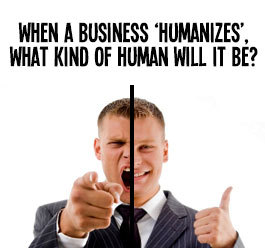
Social media is humanizing business, and few can explain how and why this is happening better than @garyvee, so I’ll let him sum it up before we move on:
[youtube http://www.youtube.com/watch?v=2UkiM3OaHxw?rel=0]
Video -> The Thank You Economy: How Business Must Adapt to Social Media
“We are living through the humanization of business. The reason that so many people watch my show, buy my books, why I’m one of the top 300 most followed people on Twitter, and by far the least famous or brand-recognized, is because I out-cared everybody.” – Gary Vaynerchuk on the ‘Thank You Economy’
Many books have been dedicated to this simple yet powerful theory, with more being written every day. Business consultants are dedicating their whole careers to helping businesses humanize themselves. Social media advocates all over the world have been heralding the rise of the humanized business as a wonderful era, full of respect for consumers and for the communities they form.
Wonderful words have been used to describe the traits of the humanized business:
Honest, Caring, Trustworthy, Open, Generous, Courageous, Dedicated, Appreciative, Respectful
And the list goes on, and on. Put it all together, and it sounds like an amazing shift for businesses. Heck, possessing all of those traits would make businesses better humans than most actual humans. Which is the crux of the whole thing. Not all humans possess all those traits, so why do we assume that humanizing a business will result in it gaining so many positive attributes?
Let’s be honest; Some humans are jerks. Some are selfish. Some are manipulative, deceitful, and greedy. Some are arrogant, boastful, and pushy. Some are just generally unpleasant, uncouth, and undesirable. It’s hard to deny that some businesses will fit these descriptions, too. Customer satisfaction rates and countless testimonials only confirm this to be true.
Of course, you can’t possibly worry about what kind of human everyone else’s business will be. You just need to look at your own, and it comes down to one thing: CULTURE. @markwschaefer hits the nail on the head in this interview with @brennermichael where he says: “The most over-looked factor in social media success is coincidentally the most important one — corporate culture.”
Without a doubt, it’s the culture contained within your organization that dictates what kind of human your business will be as the result of engaging in social communications. Does your company already care about each and every customer’s satisfaction? Does your company already care about it’s impact on the world around it? Does your company already choose to do business with ethical, well-respected suppliers and partners? These are the factors that determine social media success or failure.
Need an example of how this actually plays out in the real world? Check out the classic story of Boners BBQ as told by @unmarketing:
http://www.unmarketing.com/2012/01/10/worst-use-of-social-media-of-2012-boners-bbq/
 What kind of human did social media turn their business in to? The answer is pretty clear. I have no doubt that the culture at that restaurant was like that long before the advent of social media. Behind closed doors, conversations like that wouldn’t have gone any further than the few employees ranting about it at the end of the day. Now? Their company culture becomes visible to all, and it’s not pretty.
What kind of human did social media turn their business in to? The answer is pretty clear. I have no doubt that the culture at that restaurant was like that long before the advent of social media. Behind closed doors, conversations like that wouldn’t have gone any further than the few employees ranting about it at the end of the day. Now? Their company culture becomes visible to all, and it’s not pretty.
On the other side of the spectrum there’s the famous social superstar company, Zappos. In their own words: “Your culture is your brand.”The definitive poster child for brilliant use of social media and exceptional customer service. This company is one of the most respected humanized businesses in the world, and they are admired far and wide for their amazing corporate culture. Their customers are their best friends, and Zappos lets them know it, day in and day out.
Social media is humanizing business, no doubt about it. It truly brings the inherent traits of your business to light like no other type of communications we’ve ever seen. However, if the traits of your corporate culture aren’t the kind of traits your customers look for in new friends, you might want to take steps to fix them before opening yourself up for the world to see. After all, every human needs to do a little self-improvement from time to time.
This article originally written for http://crowdshifter.com
